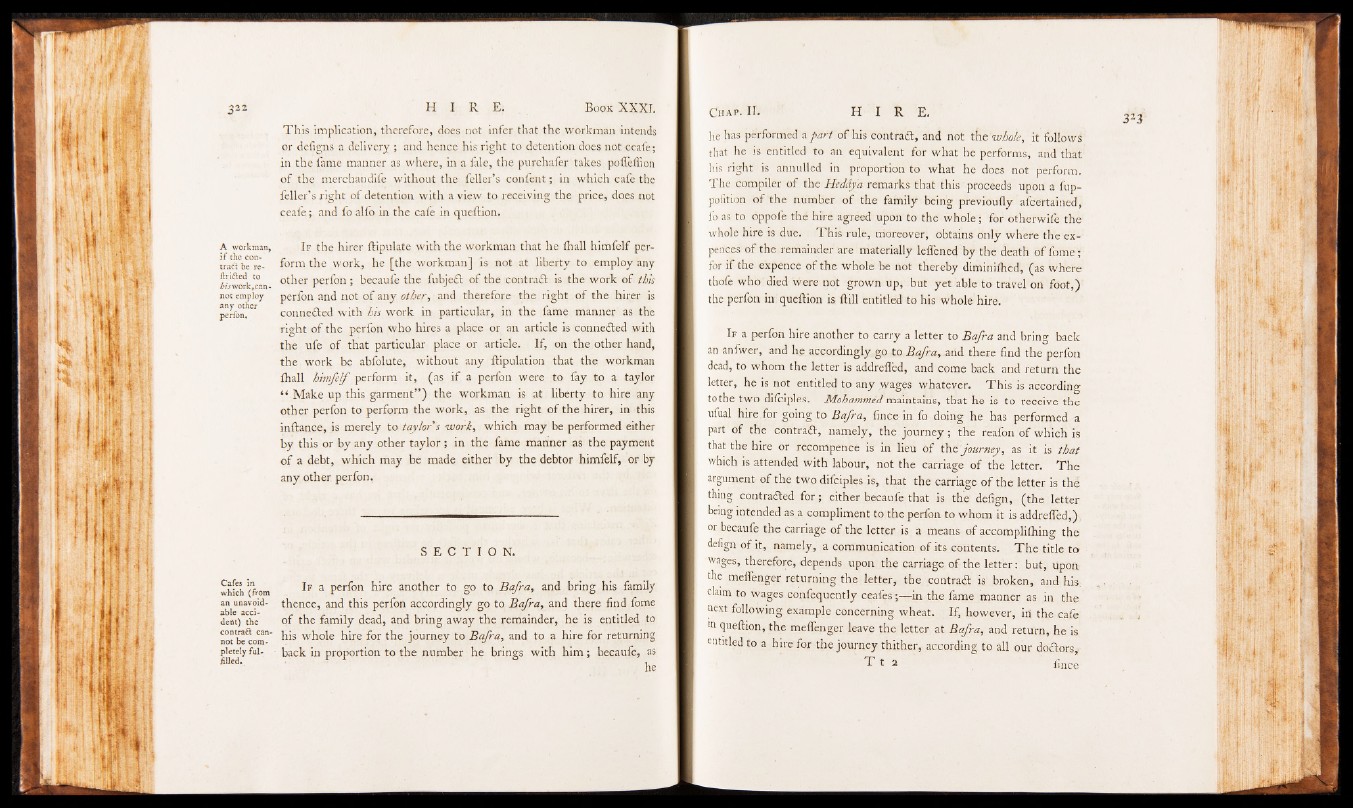
A workman,
i f the con-
tra it be re-
ftrifted to
bis work,cannot
employ
any other
perfon.
Cafes in
which (from
an unavoidable
accident)
the
contract cannot
be completely
fulfilled..
This implication, therefore, does not infer that the workman intends
or defigns a delivery ; and hence his right to detention does not ceafe;
in the fame manner as where, in a fale, the purchafer takes pofleflion
of the merchandife without the feller’s confent; in which cafe the
feller’s right of detention with a view to receiving the price, does not
ceafe; and fo alfo in the cafe in queftion.
I f the hirer ftipulate with the workman that he {hall himfelf perform
the work, he [the workman] is not at liberty to employ any
other perfon ; becaufe the fubjeft of the contrail is the work of this
perfon and not of any other, and therefore the right of the hirer is
connected with his work in particular, in the fame manner as the
right of the perfon who hires a place or an article is connedted with
the ufe of that particular place or article. If, on the other hand,
the work be abfolute, without any ftipulation that the workman
{hall himfelf perform it, (as i f a perfon were to fay to a taylor
“ Make up this garment” ) the workman is at liberty to hire any
other perfon to perform the work, as the right of the hirer, in this
inftance, is merely to taylor s work, which may be performed either
by this or by any other taylor ; in the fame manner as the payment
o f a debt, which may be made either by the debtor himfelf, or by
any other perfon.
S E C T I O N .
If a perfon hire another to go to Bafra, and bring his family
thence, and this perfon accordingly go to Bafra, and there find fome
of the family dead, and bring away the remainder, he is entitled to
his whole hire for the journey to Bafra, and to a hire for returning
back in proportion to the number he brings with him; becaufe, as
he
he has performed a part of his contract, and not the whole, it follows
that he is entitled to an equivalent for what he performs, and that
his right is annulled in proportion to what he does not perform.
The compiler of the Heddy'a remarks that this proceeds upon a fup-
pofition of the number of the family being previoufly afcertained,
fo as to oppole the hire agreed upon to the whole; for otherwife the
whole hire is due. This rule, moreover, obtains only where the expellees
of the remainder are materially leffened by the death of fome;
for if the expence of the whole be hot thereby diminilhed, (as where
thofe who died were not grown up, but yet able to travel on foot,)
the perfon in queftion is ftill entitled to his whole hire.
I f a perfon hire another to carry a letter to Bafra and bring back
an anfwer, and he accordingly go to Bafra, and there find the perfon
dead, to whom the letter is addrefled, and come back and return the
letter, he is pot entitled to any wages whatever. This is according
to the two difciples. Mohammed maintains, that he is to receive the
ufual hire.for going to Bafra, fince in fo doing he has performed a
part of the contrail, namely, the journey; the reafon o f which is
that the hire or recompence is in lieu of the journey, as it is that
which is attended with labour, not the carriage o f the letter. The
argument of the two difciples is, that the carriage of the letter is thé
thing contrailed fo r ; either becaufe that is the defign, (the letter
being intended as a compliment to the perfon to whom it is addrefled,)
or becaufe the carriage of the letter is a means of accomplilhing the:
defign of it, namely, a communication of its contents. T h e title to
wages, therefore, depends upon the carriage of the letter: but, upon
the meflTenger returning the letter, the contrail is broken, and his;
claim to wages confequently ceafes;— in the fame manner as in the
next following example concerning wheat. If, however, in the cafe
111 fttteftion, the meflTenger leave the letter at Bafra, and return, he is
entitled to a hire for the journey thither, according to all our doitors,
T t J fince